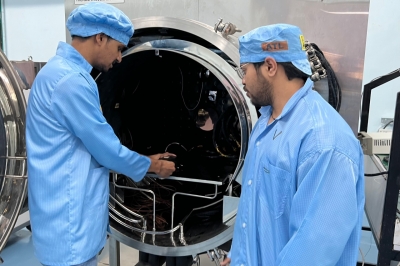New Delhi, July 4 : Spacetech startup Digantara on Monday launched the world’s first commercial space-based weather system ROBI (ROBust Integrating proton fluence metre) on the Indian Space Research Organisations’ PSLV – C53 Mission.
It is India’s one of the first commercial payloads that will utilise PSLV’s PS-4 orbital platform, the company said.
Digantara’s patented, digital space weather instrument has an extremely small footprint with power consumption of below 20 megawatt.The simplicity of integration makes it ideal to place in any satellite that goes to space, irrespective of size, shape or application.
This will also enable Digantara to increase the amount of empirical space weather data that will be available in quasi-real time.
Digantara was started by alumni of Lovely Professional University Anirudh Sharma and Rahul Rawat, under the incubation of IIS-C Bangalore.The company was backed by Kalaari Capital with a seed funding of $2.5 million in 2021.Using the amount, the startup aggressively strengthened its capabilities for furnishing a technology demonstration of its hardware infrastructure by sending an asset to space in less than a year.
“With a growing population in near Earth orbit coupled with increasing space based applications such as in-orbit refuelling, servicing, space tourism there is a need for high fidelity situational awareness to ensure effective space operations,” said Anirudh Sharma, CEO of Digantara in a statement.
“Just as terrestrial navigation services are essential for the ground logistic sector, serving as an infrastructure layer for various companies, we can leverage Space – MAPs capabilities towards providing an infrastructure layer for effective space operations,” he added.
Space weather is a complex phenomenon that arises from high energy particles, plasma, and electromagnetic waves originating from the sun or the cosmos interacting with the earth’s magnetic field.
A major space weather event can have significant repercussions on both space and terrestrial systems.Such an event can disrupt power grids, impact airline travel and disrupt high frequency communication systems, position, navigation and timing (GPS) systems leading to interruptions in communication and navigation capabilities here on Earth.
According to estimates, a significant space weather event can result in damages of up to $3.4 trillion.A similar event recently cost SpaceX 40 of its satellites.
Furthermore, European Space Agency (ESA) Swarm constellation operators observed a six-fold increase in sink rate of its satellites owing to Solar Drag.
rvt/ksk/
#Digantara #worlds #smallest #space #Delhi #Bangalore #Kannada #Bengaluru # Tara # Tara #Delhi #New Delhi #SpaceX
.






